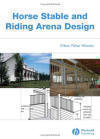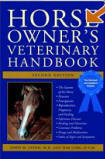|
Equine Kingdom Riding Academy
is no longer in operation. These more than 2,000 unique pages are provided for historical and educational reference. |
||
|
|
||
|
|
Cribbing |
|
Horses that receive very little stimulation or are kept inside all the time tend to get bored, and may develop vices as a result. Some horses fix their jaws on a solid object, such as a post or fence board, and arch their necks, often wind sucking too. This is called cribbing. Most of these sorts of vices start in the stall, but can be exhibited in the field too
Many times cribbing is a behavior that can be solved by full-time turnout or plenty of activity, or if he HAS to be in a stall, give him access to free-choice hay. If the weather is really bad, put a turnout blanket on him. You'd be surprised at how often a horse will choose to spend time outside rather than in a shed, given the choice. If your horse is physically agitated, it's best that you give him plenty of turnout. Make sure he has free access to salt, too. If they are salt deprived, sometimes they will chew on any surface the is available - and salt never hurts, either.
Cribbing starts out as a horse's response to stress. Because the horse learns to cope with stress by producing endorphins, that release into his brain when he's cribbing, he generally picks up the behavior for life. Thankfully, it's not a dangerous behavior - it's just very inconvenient. Sometimes it annoys owners, and some people it doesn't bother at all. Keep in mind you'll probably need to replace fence boards from time to time if you have a cribber. The best solutions, though, are full-time turnout, and if that's not available, give him as much hay as possible if he has to stay in a stall.
Sometimes a cribbing horse will teach other horses the behavior. If you have a horse that cribs, you can buy special spray to discourage the horse from chewing on wood, as well as protecting wood corners with special metal pieces made to go over wood corners and edges. It is in a horse's basic nature to consume food in continual intervals, processing food in small amounts around the clock. That's just the way their digestive system works - and if we interfere with it, it could very well turn into a vice such as cribbing. Even in the winter when there isn't grass for a horse when you turn them out, give him as much hay as he can eat - preferably so that he never has a choice to run out of hay. |





 In the stall, boredom
breeds vice. This is pretty much the equivalent to "Idle hands are the devil's playground.". Stall
confinement is not conducive to a horse's healthy or happiness, but rather to boredom and the development
of annoying and sometimes even destructive behaviors.
In the stall, boredom
breeds vice. This is pretty much the equivalent to "Idle hands are the devil's playground.". Stall
confinement is not conducive to a horse's healthy or happiness, but rather to boredom and the development
of annoying and sometimes even destructive behaviors.